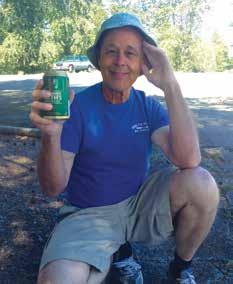
6 minute read
TECH & ETHICS
TECH & ETHICS Educational Shifts in the SFU MA-ALS for Notaries
John Whatley, PhD
In terms of its educational design, the MA-ALS Program for Notaries has become a model of the successful use of technology to deliver an applied graduate program.
In the Spring of 2021, it is now 13.5 years old and, through the COVID-19 lockdown, the Program continues to enroll and graduate 25 to 30 students per cohort.
This success has certainly been the result of the oversight of the SFU School of Criminology and the BC Society of Notaries, plus the dedication of its faculty.
It is also the result of exceptional technological management and design. Much time has been spent on how to make an excellent applied MA work remotely. The changing technology and its interwoven changes in the ethics of remote education make an interesting narrative in their own right. Tech The Program’s technological base was ready-made for the COVID-19 lockdown. And it allows depth and highly flexible access to a university graduate education for remote students from all over the province and across its diverse ethnicities, indigeneities, genders, abilities, and geographies. That flexibility is the strength of the Program and shows on both the tech side and the ethics side.
The SFU Centre for Educational Excellence (CEE) runs the tech side for the MA-ALS. Its stated mission is “to collaborate with SFU’s learning and teaching community to inspire and support innovative, inclusive, and reflective teaching approaches that create engaging learning experiences for students.”
Two values are inscribed in the mission statement. CEE is dedicated to using technologies for inclusivity, fair enough. But that singular word “inclusivity” has a double connotation. First, it entails a specific reference to an expanding range of technology and second, it is part of a specific educational goal. Let’s Look Further at the Diversity of the Tech Side. The remote palette has been widely increased to include most of the kinds of tech now available, including the latest version of the Canvas Learning Management System plus the real-time collaborative tools, Black Board Collaborate Ultra, and now Enterprise level Zoom. Together, they provide a platform that balances synchronous and asynchronous teaching and learning in new ways. Lectures and seminars are beginning to become high-techinformed with instantaneous links to libraries, websites, video, graphics, remote-student desktops, news, and the sharing of all media with and between students, on multiplatforms and with a worldwide reach.
And yes, they are supplemented by text-based discussion groups and grade books that update percentages automatically. But the interesting change, the vital innovation, is the use of lectures and seminar style discussion in real time. In its current iteration, I’m not sure if we yet understand the revolutionary nature of that change.
The breakthrough comes not from the teaching side but from the other side of the equation. The COVID-19 lockdown and the switch to home-based work and offices has dramatically increased the technical capabilities of university students. Students have become very good at real-time tech in the university “classroom.” I’ve enclosed the noun in quotation marks because the nature of that “room” is changing.
Students now expect their own tech sophistication to be reflected in online teaching and its approaches and increasingly press for more use of their media—from cell phone skills to Twitch, Twitter, TikTok, What’s App, Instagram, Youtube, Snapchat, Facebook, and video gaming. We are not yet at the point where a multimedia Youtube clip has become the equivalent of a text-based academic research paper, but we are getting close.
That is, with real-time tech, that screen-full of 25+ student presences plus an instructor has become the new in-person, face-to-
face classroom. So much so, we are at the point where any felt difference between face-to-face and remote learning is being erased. The new tech of seminar participation is having deep changes on how we teach; • where everyone has a chance to participate, share, and comment; • where subtle facial expressions and gestures, close-up tonalities of voice and eye movement are immediate and available; • where everyone can, from a wide diversity of home contexts, reach into the discussion and the building of knowledge.
After about 1.5 lockdown years, we have adapted; that type of remote teaching and learning (or a hybrid variant) will become the new norm. Tech-based teaching and learning has far too many advantages to be left behind after the COVID-19 pandemic is surmounted. The technology allows for much more individualistic design and finetuned inclusive and sensitive teaching within a now widely diverse classroom. Diversity The propulsion by tech has naturally turned into a vision of a more diverse student base. Take for instance the mandate of the SFU Applied Legal Studies Research Group—the research arm of the MA-ALS at SFU. For that group, “…the applied legal studies approach recognizes the interdisciplinary nature of law in the social world (‘law in action’ as opposed to ‘law on the books’), in which laws of different kinds are deeply intertwined with one another and with different forms of social practice.” 1
In the MA-ALS, that insight is being coupled with the new technologies such that the various inequalities of the past, all exclusions of ethnicity, gender, indigeneity, ableness, sexuality, among others are now in sight of being rectified and Notaries will perform their work in a world that reaches, from and to, every segment of society.
Based on the newer model, BC Notaries will be trained as before in drawing up viable contracts, Wills, mortgages, and witnessing documents, but they are participating in and being trained in sophisticated skills of inclusivity and are becoming adept in the new tech that allows those skills. In the new 2021 vision of the MA-ALS, the marriage of tech and diversity will make for social change (active law vs. book law).
A candidate, from all the diverse groups, having completed the MA and the provincial exams, will be entering a career on an equal footing with other professionals at all levels and be able to act across all the cultural divides, easily at home in BC’s diversity— adept professionals negotiating an increasingly complex and diverse cultural landscape. Fintech, 5G, NFTs This vision of tech-based diversity is catching. A recent article in The Economist pointed to a potentially radical shift in the technical delivery of payments and financial transactions worldwide. “Thanks to the pandemic, there has been a surge in payments online and experimentation by consumers with new services provided by digital payments firms.” 2
We are, according to the article, on the verge of making financial services available to everyone, down to the poorest households. And this redistribution will be reliant on financial technologies like digital wallets that can process payments in a few clicks, taps, or by scanning a QR code.
The blockchain technologies, along with the wider pipe allowed by 5G, will mean near-instant and cheap money transfers or credit assessment, access to past contracts, the setting up and resolving of complex mortgage chains, instant relevant data on clients, and most other Notarial transactions.
We will know the change is upon us when we begin to deal with NFTs—nonfungible tokens—as the base for proof of a “written Will.” Speed and inclusivity will be the new norm.
Creative, informed, highly diverse, technically adept, energized teaching and learning will make the MA-ALS a continued success. We are, we hope, through this Program helping change the image of the Notaries in BC to reflect their diversity, dedication, and the difficulties of the work they perform—they can now be considered members of a respected profession. s John Whatley is an Associate Member School of Criminology & Dept. of English (retired); Program Director, SFU Centre for Online and Distance Education (retired); Instructor, Department of English; Managing Editor, Simon Fraser University Publications BA (Chapman College, California); MA, PhD (Simon Fraser University). He currently instructs the Writing Guidelines seminars for the MA-ALS and occasionally teaches courses in English at SFU and Langara College.
1 SFU School of Criminology, Applied Legal Studies Program. http://www.sfu.ca/criminology/appliedlegalstudies/applied-legalstudies-research-group.html) accessed April 2, 2021 2 “Fintech comes to America, at last,” The Economist March 27, 2021, p. 10–11








